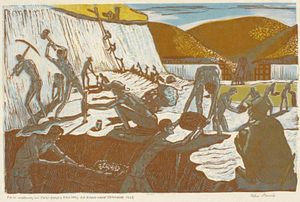On Wednesday a Japanese company, Mitsubishi Materials Corp. issued a formal apology and offered financial settlements to thousands of Chinese POWs forced to work in its coal mines during World War II.
The agreement is a rare measure intended to quell the lingering ire left over from Japan’s vicious occupation of China.
Three surviving Chinese former slave laborers met with company representatives in Beijing on Wednesday to sign the pact, which was negotiated last year in coordination with a number of civic groups in China representing the victims and their kin.
Mitsubishi Materials, formerly Mitsubishi Mining Corp., agreed to pay victims or their families 100,000 RMB ($15,000) in reparations for the forced labor and intends to build memorials at its mines to honor the victims of the war-time slavery.
The company is one of dozens of Japanese companies to use Chinese and Korean forced labor during the final years of WWII. Nearly 40,000 workers were enslaved across Japan in a variety of industries.
Mitsubishi Materials used 3,765 Chinese prisoners as forced laborers during the war. According to figures from the Japanese Ministry of Foreign Affairs, 722 of those workers died due to malnutrition and violence.
In total, if all the victims were to come forward the company would pay out nearly 370 million RMB ($56 million). The settlement is not the first of its kind, but it is the biggest.
In 2000 and 2009, the Kajima Corporation and Nishimatsu Construction, respectively apologized and paid compensation to Chinese victims of slave labor.
In the statement by Mitsubishi Materials, the company said it “will also establish a fund in China that will support further related activities, including searches for the whereabouts of other former laborers and the families of the deceased former laborers.”
Mitsubishi Materials “expressed its sincere apologies regarding its historical responsibility to the former laborers.”
“World War II ended 70 years ago. Our forced labor case today has finally come to a resolution. We have won this case. This is a big victory that merits a celebration,” 87-year-old victim, Yan Yucheng, told reporters.
Tong Zeng, president of the China Federation of Demanding Compensation From Japan, said about 95 percent of the known 1,000 families of deceased workers had agreed to the deal.
However, not everyone is happy with the terms of the settlement.
One lawyer for the Chinese victims vows to continue the legal battle. In an article in the government-authorized China.cn.org, Chinese lawyer Kang Jian said she will “continue to defend the truth and the rights of those who have been hurt.”
Kang insisted that Mitsubishi Materials deliberately avoided “mentioning in the agreement that it had colluded with the Japanese government to kidnap and enslave Chinese laborers.” She argues that the company refuses to acknowledge that many of the victims were also tortured during their time in the mines.
Meanwhile, many South Korean groups seeking similar reparations have voiced outrage at Japanese companies’ reluctance to offer formal apologies to Korean slave laborers. Mitsubishi’s latest move is sure to upset.
In 2013, a South Korean court ordered Mitsubishi Heavy Industries, a separate company in the Mitsubishi Group, to pay reparations to five victims of forced labor. The company filed an appeal.
In addition to the settlement with Chinese forced laborers, Mitsubishi Materials previously apologized to U.S. POWs in a ceremony held in Los Angeles in 2015. Throughout Japan, roughly 12,000 Americans were exploited as slave laborers, over 1,000 of whom perished.
According to its press release, the company “continues to seek a comprehensive and permanent solution with all of its former laborers and their families.”

































